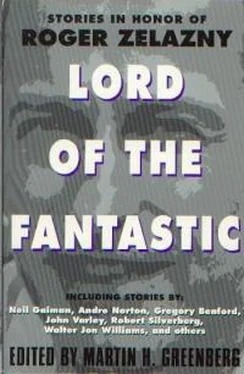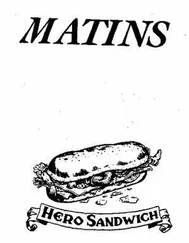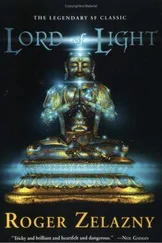“That I understand.” Electricity sparked in Thor’s eyes. “I want to know why the deceptions? Why do I appear everywhere? Why build up my army of believers?”
“Because they aren’t your believers.” I snorted derisively at him. “If all those people who worship Thor were worshiping you, this chain would be like a spiderweb to you. You could tear it and me apart. You can’t because they don’t worship you. They worship the image of you— the romanticized image of you that I project.”
I smiled. “My friend Louis and I, after having been so long linked and vilified by the Christers, realized we could never be transformed into the noble and hunky sort of god that people would accept. Lucifer had a constituency—hedonists, anarchists, selfish, venal people, and impotent people who wanted a shortcut to power. As Louis the Serpent he fed all those ‘get it now and easy’ fantasies. In showing contempt for your believers, he earned the respect of those who hated your image, and he earned quite a bit of hatred from your people. That was his payoff.”
I pressed my hands to my chest. “And I became the Thor I helped create through the media. What you sowed, I reap.”
Thor hung his head. “When you said we needed to rethink Ragnarok ...”
“I wanted it rethought because the way it was scripted before, I lost. No more. Odin is distracted by his writing and speaking and running his network. Tyr has his diversions—and I do like that Diana; she looks very good on the arm of a god. He spends most of his time suing tabloids for stories they print about him, attending parties, and running that football team he bought. Neither of them is a threat to me. Odin’s star will fade soon enough— seldom does a business guru survive more than a dozen years before being completely eclipsed, and there’s nothing more boring than yesterday’s financial genius. As for Tyr, a sportsman gigolo who bumps indolently from one resort to another becomes pitiful rather quickly. He’ll get a talk show, it will be canceled, then he can join George Hamilton on the beach.”
“And you win.”
“At least the preliminary round.”
Thor raised his head. “Why keep me around? Is it pity or contempt you have for me?”
“Neither, my friend.” I squatted again and tugged at the fringe of his beard. “I only have the utmost of respect for you. You, I need.”
“What?”
“As I said, I win the preliminary round, which means I’m going up against other gods. The Meso-Americans appear to be consolidating their pantheons. I expect the war between the Buddhists and Maoists in China will soon be resolved. Jehovah is holding his own and appears to be usurping Allah’s position. The Christ is still strong. And then there’s the serpent of Eden.”
I saw the lightning again spark in Thor’s eyes. “Yes, Thor, war might not be in vogue in this world right now, but I think the gods will change that. There’s going to be a new Ragnarok, a bigger, nastier one, and in it, my friend, you will get your crack at a serpent.”
His hunger was such that I could taste its bitterness. “Promise?”
“You have my solemn oath on it.” I smiled, then stood and let the mist hide him from me. “The true Twilight of the gods fast approaches and this time, I mean to survive to the dawn.”
* * * *
AFTERWORD
There is something Messianic about Roger Zelazny—and part of it is the fact that he’d reject that idea out of hand, while still being entertained by it. I feel that incipient Zelazny cultus whenever those who knew Roger get together and talk about him, or tell others about him. The man’s impact on us was such that it must be shared.
I met Roger only three years before his death, but I get the impression that knowing him for an hour was knowing him for a lifetime—at least as much as any of us could know him. His genius was palpable, likewise his keen interest in anything and everything. And that included us. I can’t recall a phone conversation with him, no matter how brief, that didn’t include him asking me what I was working on and how it was going. He seemed less interested in the nature of the work than he was in how I felt about it as a writer.
This sense of the Messianic is not the reason I wrote this particular story, however. I have no doubt that in the world of Asgard Unlimited there is a Church of Roger duking it out with the First Assembly of Elvis or showing the Church of Scientology what kind of religion you can get out of a real writer. I wrote this story because I felt it was the kind of story Roger could have written—and I would have loved to see what he would have done with the concept.
The other reason I wrote it was because I think it was the kind of story Roger would have enjoyed reading. Trying to produce a story that lives up to that kind of billing is very tough. I remember fighting that battle when I wrote my portion of Forever After, pushing myself to come up with something that would do justice to the assignment Roger had given me. As difficult a task as that was, it’s one that really pushed me as a writer, and that is something I know would have made Roger very pleased.
Barring the establishment of a Church of Roger (I keep seeing Robert Schuler’s Crystal Cathedral and wondering what it would look like in amber), I guess writing stories that would have entertained the man is the only way to pay homage to him. Too little, perhaps, and way too late, but it works, and for now that will have to be enough.
WHEREFORE THE REST IS SILENCE
GERALD HAUSMAN
In Ketchum, Idaho, the little town where Ernest Hemingway had taken his life, I lay stretched out in the sun, enjoying the clear cold mountain air, and the only thing moving around in the desolated cottonwood trees was the eye of a magpie. I was thinking, however, not about Hemingway but of my friend, Roger Zelazny, and how he had urged me to take this trip.
We were talking about daemons one day, and he said in that cellar-deep voice of his, “Yes, I’ve seen a few.”
I asked him if he had ever done battle with a daemon, a real one.
“As a matter of fact, I have,” he said. And said no more.
So I explained that one of my personal daemons was Ernest Hemingway.
“Why Hemingway?” Roger asked.
So I told him that my father had physically resembled Hemingway, and that, from the earliest time that I could remember, I always identified with Hemingway as a father figure.
“In the literary sense?” Roger queried.
“I’m afraid not,” I said. “You see, he looked so much like my dad that I sometimes thought they were the same man. An overactive imagination will do that for you when you are a kid.”
“So Hemingway,” he mused, “is someone you must meet, if not in the flesh, then in the spirit. And if only to find out that you are wrong—that he is nothing like your own father.”
I nodded. Then, “Do you believe that the spirit lives on after death?”
He chuckled. “The spirit lives before, during, and after death, and it is no more confined to our definitions of existence than we are bound by our limitations in not being able to see it with our eyes. For some people, there is only spirit; for others there is only flesh. Your man Hemingway had a great deal of spirit, of life-force, we might say, and something of that must live on in that place that he loved up there in Idaho.”
Читать дальше






